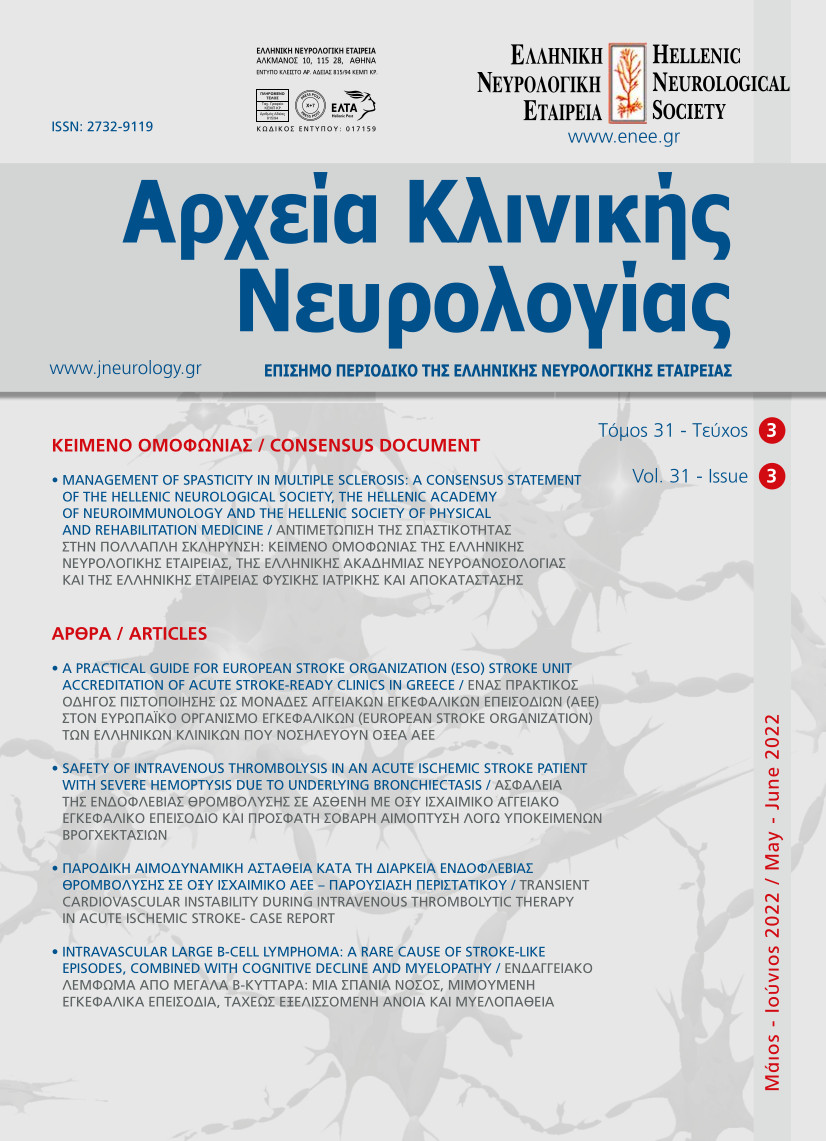ΑΝΤΙΜΕΤΩΠΙΣΗ ΤΗΣ ΣΠΑΣΤΙΚΟΤΗΤΑΣ ΣΤΗΝ ΠΟΛΛΑΠΛΗ ΣΚΛΗΡΥΝΣΗ: ΚΕΙΜΕΝΟ ΟΜΟΦΩΝΙΑΣ ΤΗΣ ΕΛΛΗΝΙΚΗΣ ΝΕΥΡΟΛΟΓΙΚΗΣ ΕΤΑΙΡΕΙΑΣ, ΤΗΣ ΕΛΛΗΝΙΚΗΣ ΑΚΑΔΗΜΙΑΣ ΝΕΥΡΟΑΝΟΣΟΛΟΓΙΑΣ ΚΑΙ ΤΗΣ ΕΛΛΗΝΙΚΗΣ ΕΤΑΙΡΕΙΑΣ ΦΥΣΙΚΗΣ ΙΑΤΡΙΚΗΣ ΚΑΙ ΑΠΟΚΑΤΑΣΤΑΣΗΣ
Λέξεις-κλειδιά:
σπαστικότητα, πολλαπλή σκλήρυνση, μυοχαλαρωτικά, ενδοραχιαία βακλοφαίνη, βοτουλινική αλλαντοτοξίνηΠερίληψη
Η σπαστικότητα είναι μια αισθητικο-κινητική διαταραχή που χαρακτηρίζεται από μια εξαρτώμενη από την ταχύ-
τητα υπερτονία και αποτελεί μια κοινή αιτία αναπηρίας και διαταραχής της ποιότητας ζωής (QoL) στην πολλα-
πλή σκλήρυνση (ΠΣ). Επιδημιολογικά στοιχεία υποδεικνύουν έναν πολύ υψηλό επιπολασμό σπαστικότητας
σε έδαφος πολλαπλής σκλήρυνσης (ΣΠΣ) έως και 80% μεταξύ των ασθενών με ΠΣ. Η ΣΠΣ χαρακτηρίζεται
από ένα ευρύ φάσμα κλινικών εκδηλώσεων και σχετιζόμενων επιπλοκών, που συμβάλλουν στην επιδείνωση
των κινητικών ελλειμμάτων και στην απώλεια της ανεξαρτησίας των ασθενών με ΠΣ, ενώ χωρίς έγκαιρη θερα-
πεία, η ΣΠΣ μπορεί να οδηγήσει σε μόνιμες παραμορφώσεις αρθρώσεων, μυϊκές συγκάμψεις, πόνο, ακούσιες
κινήσεις και δερματικές επιπλοκές. Η διάγνωση και η κλινική παρακολούθηση της ΣΠΣ απαιτεί την εφαρμογή
καθιερωμένων κλινικών κλιμάκων (Κλίμακα Ashworth, τροποποιημένη κλίμακα Ashworth, κλίμακα Tardieu),
αλλά απαιτεί επίσης τη χρήση λειτουργικών κλιμάκων που ενσωματώνουν παραμέτρους σημαντικές για τον
ασθενή. Η διαχείριση της ΣΠΣ θα πρέπει να συντονίζεται από διεπιστημονικές ομάδες που απαρτίζονται από
Νευρολόγους και ιατρούς Φυσικής Ιατρικής και Αποκατάστασης. Οι θεραπευτικοί στόχοι περιλαμβάνουν τη
συνολική κλινική και λειτουργική βελτίωση του ασθενούς, την πρόληψη επιπλοκών και συγκάμψεων, καθώς
και τη διευκόλυνση της νοσηλευτικής φροντίδας του ασθενούς. Οι θεραπείες της ΣΠΣ περιλαμβάνουν μη φαρ-
μακολογικές προσεγγίσεις όπως συνεδρίες αποκατάστασης με εξειδικευμένες τεχνικές, και φαρμακοθεραπείες,
συμπεριλαμβανομένης της χορήγησης από του στόματος αντισπαστικών, ενδορραχιαίων μυοχαλαρωτικών
και ενδομυϊκών ενέσεων αλλαντοτοξίνης. Το παρόν άρθρο ομοφωνίας συνοψίζει τα επιστημονικά δεδομένα
σχετικά με τις φαρμακολογικές και μη φαρμακολογικές θεραπείες της ΣΠΣ, παρέχοντας συστάσεις μιας ομάδας
ειδικών αναφορικά με τη διαγνωστική προσέγγιση και τη θεραπευτική διαχείριση της ΣΠΣ.


